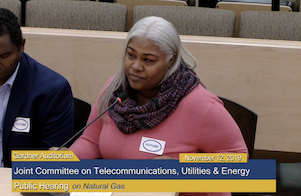Legislation for a Gas-Free FUTURE

After the Merrimack Valley gas disaster, HEET spearheaded ideas for omnibus gas legislation, then worked with Gas Leaks Allies and 51 cosponsors to rethink how gas companies deliver heat to customers in Massachusetts. Our state’s requirement to reduce emissions 80% by 2050 means that our gas companies, with all of their workers, have no long-term business model. The FUTURE Act (For Utility Transition to Using Renewable Energy) allows gas companies to sell Btus of heat, not just therms of gas, mandates gas companies to deliver an increasing percentage of their thermal load through renewables each year, and does not allow new fossil fuel infrastructure to be depreciated past 2050.
The result would move our state from an explosive, potent greenhouse gas, to local, safe renewables, while also throwing a lifeline to gas companies.

A key event recently was the Joint Committee on Telecommunications, Utilities, and Energy (TUE) hearing on gas bills submitted this session. Gardner Auditorium at the Massachusetts State House filled on November 12 with 300 people, most wearing FUTURE stickers. Thirty-seven people testified in support of the Act, and none spoke against.
The stark revelations of the Merrimack Valley gas disaster and the existence of persistent, ongoing leaks were on top of many speakers’ minds. Boston Mayor Marty Walsh spoke about how the gas disaster “brought into sharp focus the threat to our towns and cities. Every unaddressed gas leak is canceling out part of our progress. We need to make sure our climate is clean, and our cities are safe.”

Merrimack Valley residents told stories of survival and frustration at the inefficiencies and lack of preparedness in the response. Pastor Bluemel expressed her frustration at the lack of basic information, such as maps of buried gas pipes and electricity conduits, a lack which remains to this day. Ana Javier talked about the lack of resources for environmental justice communities, and Kate McHugh spoke movingly of coming home from a total hip replacement to utter chaos, an inability to obtain needed medication, and no way to get out of her home to safety.

Audrey Schulman, HEET Executive Director, asked the legislators present to think about the premise of gas distribution: “Imagine if I proposed to you now that we should heat our homes with an explosive gas through a system of leaky, underground pipes. How would you react?”
Insightful testimony continued through the afternoon about public health, stranded assets, climate impact, utility business models, leak detection technology, dying trees, and protecting our children. Bills that specifically address worker safety garnered support, but it was the FUTURE Act that captured people’s hope and imagination. This comprehensive bill both addresses current safety issues and lays out the policy needed for a new renewable thermal energy business model.

Senator Barrett pointed out to National Grid that “there is no way you’re going to restore public confidence in gas.” He focused more on what the detailed utility business plans would look like and how we would market thermal energy and appliance replacement to customers.
While there are no guarantees, HEET is optimistic that the urgency of the testimony and its positive reception will lead the Joint Committee to report the bill out of Committee to Senate President Karen Spilka and Speaker DeLeo. It is never too late to call your state representative and senator to urge their support.








